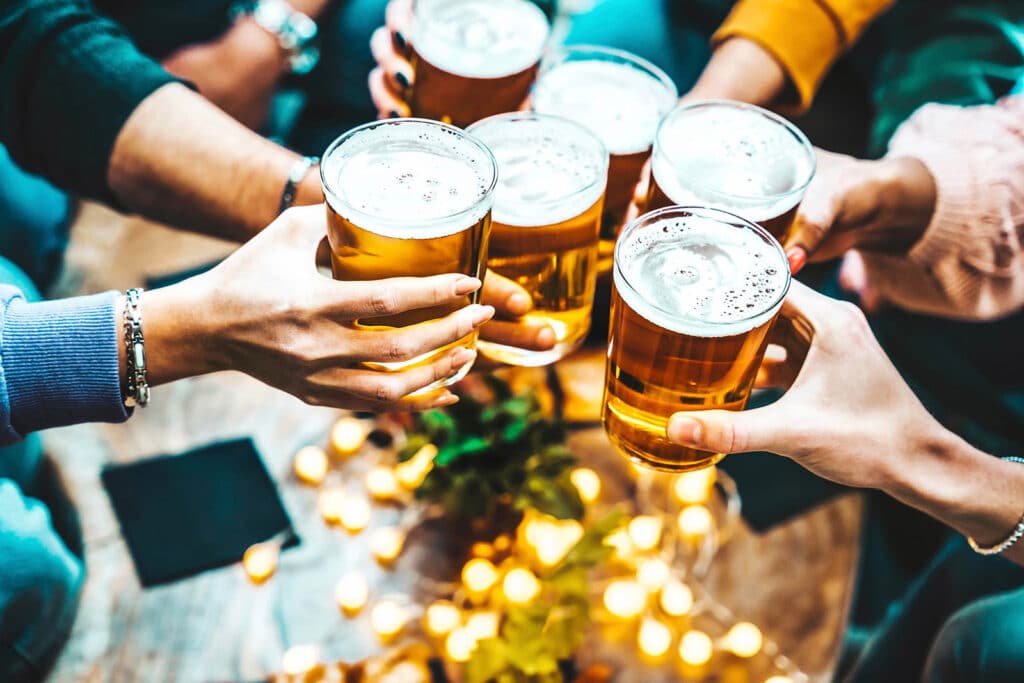We all have moments where we say tactless or hurtful things. Maybe you were too honest about your friend’s new love or told your partner how they really look in that new outfit. These moments may feel more frequent when you’ve been drinking.

Many people say that alcoholic beverages lower your inhibition and lead you to say things without regard for the consequences. This idea is not new. French philosopher Jean-Jacques Rousseau once stated, “A drunk mind speaks a sober heart.” Over time, this phrase turned into the common saying “drunk words, sober thoughts.” The saying is so well-known that musicians like French Montana, Sevyn Streeter, and Dr. Blackfoot wrote about it in their songs.
If you regret something you said while drinking, you may feel that alcohol is at fault. Is there any truth to this saying, or is it an excuse for poor behavior? Does alcohol make your unfiltered thoughts spill out? We can find out the answer to this question by exploring what happens in your body and brain after drinking.
Table of Contents
The Science of Alcohol and Behavior
When you have a few drinks, you may experience physical symptoms like glassy, slurred speech, and poor balance. Your cheeks may flush, and your eyes may turn red. Water retention may cause your face and fingers to bloat.
The effects of alcohol extend beyond physical symptoms on the surface. You also may notice behavioral changes. We all know the stereotype of the “angry drunk” – people who become aggressive after a few drinks. Alcohol also can make you more gregarious. You may talk louder and be more social. In order to keep the party going, you may buy drinks for friends. These physical and behavioral characteristics hint at more complicated processes occurring inside the body and brain.
Alcohol and the Brain
Alcohol’s side effects begin in the brain. When you drink, your body begins processing the alcohol in the stomach. The stomach’s lining absorbs the alcohol and sends it to the bloodstream. Once alcohol enters the bloodstream, it quickly moves to the tissues in your body. Within five minutes, the alcohol reaches the brain. You may start to feel impaired ten minutes after that first drink. Twenty minutes after you begin drinking, your liver begins to process the alcohol.
Many people assume that it takes multiple drinks to affect the brain, but research shows that even one drink can have a noticeable effect on the human body. In January 2018, a peer-reviewed study published in the medical journal PLOS One stated that one drink impacted cognitive functioning. A research team from San Diego State University asked 18 social drinkers to drink one cocktail and then complete a simple color-matching task on a computer. Investigators also measured participants’ brain activity.
The SDSU team discovered that one drink reduced the brain’s theta waves, which affect memory, cognition, and behavior. After one drink, participants’ accuracy declined, even though their time to complete the task remained the same. The research team concluded that one drink affects decision-making ability, but the drink did not affect the brain waves that control motor skills. This combination of impaired decision-making and unaffected motor skills can lead people to make poor decisions, like driving while impaired.
Alcohol’s Impact on Decision-Making and Emotions
Whether you’re just having a beer while watching the game or having a few drinks with friends, any amount of alcohol will affect your decision-making skills. In addition to affecting your ability to make decisions, alcohol affects your emotions. How alcohol affects your emotions depends on your personality while sober. For example, alcohol will not stimulate anger in a person who doesn’t have anger or irritability as an underlying personality trait. If you suffer from depression or anxiety, the depressant effects of alcohol may increase feelings of sadness.
In a 2013 study, researchers identified the risk factors that indicate a person may be more likely to experience alcohol-related regression. Male drinkers who display sensation-seeking behaviors and irritability are more likely to display anger and aggression while drinking. Binge drinking and consuming cocktails mixed with energy drinks increase the chances of becoming aggressive.
People who drink may experience lowered inhibition and increased impulsivity. Alcohol use reduces activity in the area of the brain that manages impulse control. For people who drink frequently, this reduction in impulse control can lead to aggression and sexual impulsivity. People under the influence of alcohol may flirt or cheat. They may overreact aggressively to perceived offenses.
The Relationship between Alcohol and Communication
People who use alcohol may make statements that they wouldn’t say while sober. This unfiltered speech happens because of how alcohol affects the brain’s communication pathways. Over time, heavy drinking affects the right hemisphere of the brain and the prefrontal cortex. These areas control speech, memory, and judgment to deteriorate. As these neurons deteriorate, people may notice changes in speech and perception.
These side effects become more pronounced when a person suffers from an alcohol use disorder. When heavy drinking turns into alcoholism, the person may experience significant impairment. A 2018 study showed that people suffering from alcoholism have flat, emotionless voices. While a sober person can convey meaning through tone, a person under the influence of alcohol may lose that ability. They also may experience difficulty identifying emotions in other people. Over time, these difficulties with speech and perception can damage their relationships.
People with an impaired ability to perceive and express emotion may take offense to casual remarks. While sober, they may not express their outrage. Lowered inhibition, impaired judgment, and increased anger from alcohol use combine to create a perfect storm. The person under the influence may lash out and say things they don’t mean.
Other Factors to Consider
How alcohol affects your emotions and communication depends on several other factors that can change over time:
Alcohol Tolerance
If you consume alcohol frequently, you may notice a decrease in side effects over time. This decrease is known as functional tolerance. When a person develops a functional tolerance to alcohol, they may feel like they need to increase the amount they drink to feel the side effects again. For example, during your first few experiences with alcohol, you may have experienced side effects after one or two drinks. As you develop a tolerance to alcohol, it may take four or five drinks to get the same effect.
Increased alcohol tolerance can be a symptom of larger problems. Alcohol tolerance is a risk factor for alcohol abuse and alcohol dependence.
Emotional State
When you have a few drinks, your brain initially releases dopamine and serotonin. You may notice that you feel happier and less anxious. For people with pre-existing mental health conditions like anxiety and depression, alcohol can exacerbate these conditions.
According to the National Institute of Alcohol Abuse and Alcoholism, a person with an alcohol abuse disorder may experience symptoms that are similar to depression, anxiety, psychosis, and antisocial behaviors. Reduced inhibition, combined with these symptoms, may lead you to say hurtful things to the people you love.
Debunking the Myth
Even though your drunk words may reflect what you think while sober, does it mean that the hurtful remarks are true? Not neccesarily, say researchers. A 2011 study found that participants who drank knew they were making poor decisions. Lowered inhibition meant they continued to make mistakes and didn’t care about the consequences.
Many people claim that they can’t remember the harmful things they said while under the influence. This claim may be difficult to believe, but research confirms that over time, alcohol use affects your memory. A 2013 study showed that long-term alcohol use affects short-term memory. Alcohol inhibits the transfer of information from your short-term memory to your long-term memory. This disruption means you may not remember what you said or did while drinking.
The Truth Behind the Saying
Alcohol lowers inhibition, disrupts communication, and impairs judgment. Inhibition and good judgment stop us from speaking every hurful thought. When alcohol lowers your inhibition, you may be more likely to speak the truth in your heart.
However, if you are a person who experiences depression, anxiety, or alcohol dependence, the saying “drunk words, sober thoughts” may not apply to you. Alcohol abuse can trigger pre-existing feelings of anger, sadness, and anxiety. These feelings may color your “drunk words” so that they don’t reflect your sober thoughts.
Final Recommendations
If you regret your drunk words, there is help available. Miracles Recovery Center offers treatment for people who exhibit problematic behaviors while drinking. No matter what challenges you’ve experienced, we offer a supportive environment for all our clients. Our therapists offer individual and group therapy in a safe setting. We offer several treatment options, including in-home detox, rehab, outpatient treatment and in-patient treatment.
At Miracles Recovery Center, our experts understand the different struggles faced by women, seniors, and young adults. We offer support for the whole family.
Don’t wait to seek help for your alcohol use. Contact Miracles Recovery Center to learn more about our programs.
FAQ
Is there any truth to the saying “drunk words are sober thoughts”?
How does alcohol affect decision-making and speech?
Can alcohol make people more honest?
Why do people sometimes regret what they said while drunk?
Can alcohol cause people to lie?
Is it possible to completely trust what someone says while intoxicated?
Can alcohol reveal hidden feelings or desires?
How can I address a concern about something said while drunk?
Should I take drunk confessions seriously?
Can a relationship be affected by drunk words or actions?
Where can I find sober living programs near Port St. Lucie?
References:
https://www.medicalnewstoday.com/articles/321255#Drinking-impairs-decision-making
https://www.verywellmind.com/alcohol-facilitates-aggression-62647
https://www.healthline.com/health-news/alcoholism-can-lead-to-trouble-communicating#What-can-be-done?
https://www.verywellmind.com/alcohol-abuse-vs-alcohol-dependence-63101
https://pubs.niaaa.nih.gov/publications/arh26-2/90-98.htm










